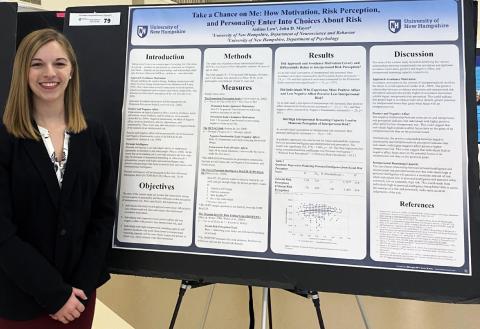
Aislinn Low '22 – a student in the Neuroscience and Behavior program at COLSA – presented at the 2022 UNH Undergraduate Research Conference on how certain personality traits can affect individual perception of interpersonal risk.
Aislinn Low: Take a Chance on Me: How Motivation, Risk Perception, and Personality Enter Into Choices About Risk
Aislinn: My research examines how various personality characteristics and traits, such as approach-avoidance motivation (i.e., the desire to build interpersonal connections or avoid rejection), emotion-related traits (e.g., positive and negative affect), and personal intelligence, relate to an individual's perception of interpersonal risk.
Learn more
Aislinn: ? Although my research does not measure the accuracy of interpersonal risk perceptions, it does open the door for understanding how an individual's ability to understand themselves and others (personal intelligence) may affect their interpersonal risk perception. Identifying this relationship may provide insight into how promoting a greater understanding of one's own personality and other peoples' personalities could lead to more accurate perceptions of interpersonal risk.
Aislinn: During my research, I found that individuals exhibiting high interpersonal risk perception displayed higher avoidance motivation, higher negative affect (Negative Emotionality), and lower positive affect (Extraversion). One of the most interesting findings I made during my research is that individuals with high personal intelligence exhibited a moderate perception of interpersonal risk, while individuals low in personal intelligence exhibited either very low or very high interpersonal risk perception.
Aislinn: Participating in the URC allowed me to further refine my professional presentation skills and increased my confidence in conducting research and communicating said research to other people within and outside my field of study.
Aislinn: I was assisted by Dr. John Mayer and graduate student Hannah Lightcap, M.S., M.A., throughout this project.